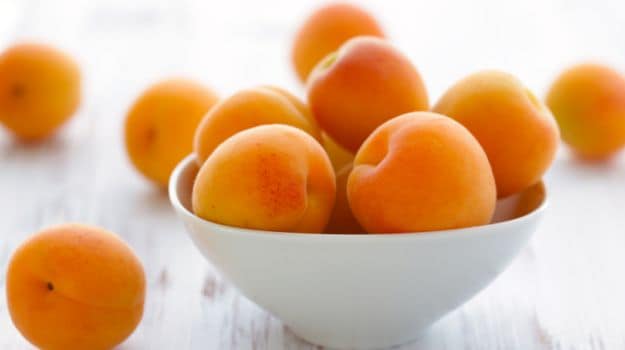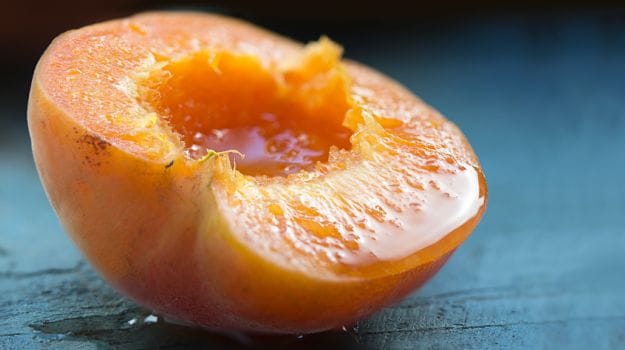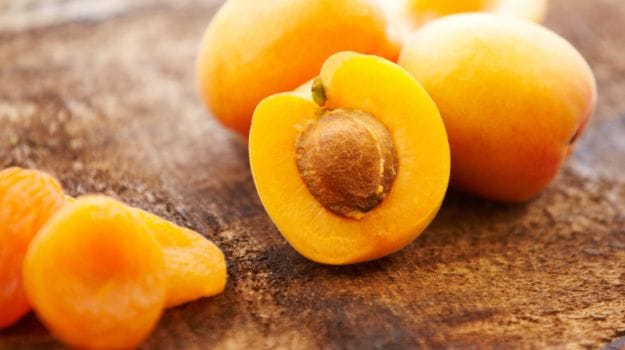APRICOTS

One of the most versatile fruits, common knowledge claims that the apricot was originally cultivated in China, till the Persians discovered it. There’s also dispute that it originated in Armenia since the fruit has been cultivated there since ancient times. It was when the fruit found its way to the Mediterranean that its true popularity came to light. The Spanish explorers are given credit for introducing the fruit to the Americas, where today it thrives. And there’s another school of thought that claims that the apricot was growing in India way back in 3000BC. Disputes aside, the benefits of apricot are rarely denied by any. In fact, it’s as popular raw as it is cooked. The dried version of this fruit is globally loved, and in fact forms an important part of Iran’s global trade. Countries such as Turkey, Italy, Russia, Spain, Greece, USA and France are considered to be the leading producers of apricots. This yellowish-orange fleshy fruit is quite a curious little thing. The tiny hairs on the outer skin lend a soft furry texture, and can be eaten without having to be peeled. It’s also one of the healthiest fruits in the world, with loads of benefits. It’s said that 100 grams of fresh apricots gives you 12% of vitamin C, 12% of vitamin A, and 6% of potassium required by the body – all this under less than 50 calories. Having said that, let's learn about apricot benefits.
Here are 8 amazing apricot (khubani) benefits you need to know:
1. Good Source of Vitamin A

Roasted apricot with honey
2. Rich in Fiber
Whether you eat it dried, or fresh, apricots are a good source of dietary fiber. Given that the retinol in apricot is fat soluble, the fruit dissolves in the body easily, and the important nutrients are easily absorbed by the system. And it breaks down fatty acidsfast, which means your digestion is in order. And not only that, the fruit protects you from gastrointestinal concerns by cleaning out the intestines regularly.
3. Good for Your Heart
Given that the fruit is high on fiber content, it helps to reduce the bad cholesterol content in the body, and that means your heart is protected. And at the same time, it increases the good cholesterol. Plus the potassium content in the fruit balances the electrolyte levels in our system, keeping our heart muscles in order. All you have to do is eat one or two fresh apricots every day, or a handful of dried ones.
4. Treasure Chest of Antioxidants:
Ripe apricots are natural sources of antioxidants. When consumed daily, it helps the body to get rid of toxins that we tend to collect over time. Antioxidants in turn also kill free radicals that damage our cells.
5. Good for Your Blood:
Any plant produce that contains iron has non-heme iron, and that includes apricot. This type of iron takes its time to be absorbed by the body, and the longer it stays in the system, the better your chances in preventing anemia. It’s recommended that you take some vitamin C along with it to ensure better absorption of the non-heme iron.
Whether you eat it dried, or fresh, apricots are a good source of dietary fiber. Given that the retinol in apricot is fat soluble, the fruit dissolves in the body easily, and the important nutrients are easily absorbed by the system. And it breaks down fatty acidsfast, which means your digestion is in order. And not only that, the fruit protects you from gastrointestinal concerns by cleaning out the intestines regularly.
3. Good for Your Heart
Given that the fruit is high on fiber content, it helps to reduce the bad cholesterol content in the body, and that means your heart is protected. And at the same time, it increases the good cholesterol. Plus the potassium content in the fruit balances the electrolyte levels in our system, keeping our heart muscles in order. All you have to do is eat one or two fresh apricots every day, or a handful of dried ones.
4. Treasure Chest of Antioxidants:
Ripe apricots are natural sources of antioxidants. When consumed daily, it helps the body to get rid of toxins that we tend to collect over time. Antioxidants in turn also kill free radicals that damage our cells.
5. Good for Your Blood:
Any plant produce that contains iron has non-heme iron, and that includes apricot. This type of iron takes its time to be absorbed by the body, and the longer it stays in the system, the better your chances in preventing anemia. It’s recommended that you take some vitamin C along with it to ensure better absorption of the non-heme iron.

The fruit with a seeded centre
6. Good for the Skin:
The combination of Vitamin C, A, and phytonutrients ensures good skin. And did you know that the antioxidants in the apricot also slow the ageing process? So apart from a good skin care regime, don’t forget to eat some apricots every day.
7. It’s Diet Friendly:
The dietary fiber in the fruit improves your digestive system, which helps to increase your metabolism. And it’s often recommended that you eat a few apricots as a snack when you’re feeling peckish, especially if you’re on a diet. It fills you up but doesn’t add unnecessary calories. However, remember to rinse your mouth after you eat the dried version. Dried fruits contain more sugar, and you don’t want that to affect your dental health.
6. Good for the Skin:
The combination of Vitamin C, A, and phytonutrients ensures good skin. And did you know that the antioxidants in the apricot also slow the ageing process? So apart from a good skin care regime, don’t forget to eat some apricots every day.
7. It’s Diet Friendly:
The dietary fiber in the fruit improves your digestive system, which helps to increase your metabolism. And it’s often recommended that you eat a few apricots as a snack when you’re feeling peckish, especially if you’re on a diet. It fills you up but doesn’t add unnecessary calories. However, remember to rinse your mouth after you eat the dried version. Dried fruits contain more sugar, and you don’t want that to affect your dental health.

Dried apricots
8. It Strengthens Your Bones
Calcium is much required in the formation and development of bones, and apricot has lots of it. What’s also interesting to note that without enough potassium in the body, thecalcium is not absorbed and disposed of uniformly. And the good news is that the apricot has both of them!
8. It Strengthens Your Bones
Calcium is much required in the formation and development of bones, and apricot has lots of it. What’s also interesting to note that without enough potassium in the body, thecalcium is not absorbed and disposed of uniformly. And the good news is that the apricot has both of them!
Apricot Nutrition Value
According to the United States Department of Agriculture, a 100-gram serving of apricot has 48 calories, 1.40 grams protein, 0.39 grams fat, 11.12 grams carbs, 2 grams fibre, and 9.20 grams of sugar.
How to Add Apricots to Your Diet
Like most tasty fruits, the apricot can be eaten in multiple ways. The dried and the fresh version are the easiest. But you could also chop apricots up and add them to your morning cereal. You can even make a blend of it with yoghurt and make a dip or a spread for bread (if you don’t mind a sweetish sandwich that is). Apricots are also used liberally in jams and preserves, and if you can figure out a recipe that uses little or no sugar, you can eat it without feeling too guilty.
Apricot tarts, pies, crumbles and cakes are popular, but did you know you could also use apricot to add extra flavour (and health of course) to your salad? The fruit goes well with green leaves, feta, and almonds. And all you need to finish the salad is a littlebalsamic dressing!
Dried apricots are of course way easier to store, as long as you don’t keep it under too much light, but fresh apricots need to be consumed quicker as the skin might get wrinkled, and the fruit will begin to lose its efficacy.
Apricot tarts, pies, crumbles and cakes are popular, but did you know you could also use apricot to add extra flavour (and health of course) to your salad? The fruit goes well with green leaves, feta, and almonds. And all you need to finish the salad is a littlebalsamic dressing!
Dried apricots are of course way easier to store, as long as you don’t keep it under too much light, but fresh apricots need to be consumed quicker as the skin might get wrinkled, and the fruit will begin to lose its efficacy.
